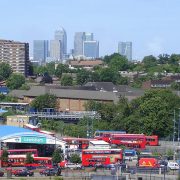It is two degrees above freezing, and forty people – from teenagers to pensioners – huddle round a blazing bin fire outside Lewisham Town Hall. Their fuel: an impressive stack of backlogged final warnings, doom-harbouring overdue payments, and red-topped notices of intent to cancel energy accounts.
This is the start of the Winter Warm-up weekend of direct action called by campaign group, Fuel Poverty Action. The Lewisham bill-burning is just one of a nationwide series of protests aiming to highlight the injustice of the “Big Six” energy companies’ control over resources.
Protester Chris Walker, 57, was a teacher in Lewisham for twenty years before a health scare meant that, for the first time in his life, he was forced to take a year off work. His pay was cut in half, and he received a small amount of disability benefits. But the £930 he received per month did not stretch much further than the £900 monthly rent he pays on his small, one-bedroom flat in Catford.
With just £30 a month to spend on food, council tax, energy and water, Chris decided to stop paying his bills and to wait and see what would happen. And actually, nothing did. “I got a bunch of letters from people saying I need to pay this or that, but things just moseyed along. Nothing happened. I haven’t paid my gas, electricity, or council tax for over a year”, Chris tells me.
But this sort of lifestyle isn’t for the faint hearted; Chris admits that he is wary about answering his doorbell, and hasn’t picked up the phone in over six months. He has to live knowing that one day one of his debtors will catch up with him and he’ll be made to pay up.
I ask him if he thinks his actions are brave and he laughs my question off. “It’s not brave, it’s necessary”, he says. “I was absolutely forced into this course of action. The energy companies are hiking their prices, making huge profits, and paying executives massive bonuses. I could carry on paying my bills and not doing anything about it, but instead I’m going to have my own one-man protest and see where it goes”.
But not everyone is as foolhardy, or as reckless, as Chris. Eventually EDF and British Gas will cotton on to Chris’s plan and turn off his heating, electricity, and water. But for many, living without vital energy supplies is already a reality. A study by Age UK this month revealed that 50 per cent of British pensioners have been forced to turn down their heating this winter when they are not warm enough in an attempt to save money. Around 2 million elderly people admitted to being so desperately cold in their homes that they are going to bed when they are not tired, and a similar number have been forced to move into one room in an effort to keep energy bills down.
The report also shows that some older people are cutting back on food to save money, something that Mervyn Kohler from Age UK doesn’t believe is much of a choice. “People who are cutting back on the amount of fuel they are using are jeopardising their health. They are going to end up exacerbating respiratory illness; they are going to end up isolating themselves in their own homes, feeling miserable sitting in a cold house”, Kohler told The Guardian this week.
Indeed, it is not just the elderly feeling the strain, as increasing energy bills, soaring rents, and stagnating incomes mean that the number of people deemed “vulnerable” in our society is rocketing. This is something Chris discovered when his sudden fall into unemployment made him reconsider what he had always imagined was his human right to security. “When I lost my job I realised that all of us are one heartbeat away from becoming homeless, and that’s a terrifying thought.”
And of course, such strained times breed a flurry of new terms to define them. A household is said to be in ‘fuel poverty’ when more than 10% of its income is spent on maintaining an ‘acceptable amount of warmth’ in the home. Incredibly, one in four households in England and Wales have fallen into fuel poverty this winter, a dramatic increase from earlier in 2011, when 20 per cent of families were considered in need. The increase is embarrassing for the government, which has a statutory obligation to eliminate fuel poverty by 2016. The Coalition now looks certain to fail to meet its legal duty.
Fuel poverty is more likely for low-income and single person households, with more than half of all fuel poor homes housing a single adult – a worrying statistic for people such as Chris. According to statistics collected for the English Housing Survey, more than 40 per cent of the lowest income homes, and 17 per cent of social housing tenants are also in fuel poverty.
On the same evening as the Lewisham protest, the Manchester Climate Action Group transformed a number of billboards in a crafty act of ‘subvertising’. The word “M*th*r F*ck*rs” now towers over a busy residential street in the city, the asterisks replaced with the logos of E-on, EDF, British Gas, Npower, Scottish power, and SSE.
The messages may be light hearted, but the reality of fuel poverty is, in fact, terrifying. In the winter between 2010 and 2011, there were 25,700 excess winter deaths in the UK. The government-commissioned Hills Poverty Review believes that 2,700 were directly due to those people being ‘fuel poor’.
Undoubtedly, last winter was particularly harsh – the coldest on record since 1910 – and some may be aware that numerous companies, including EDF Energy, recently agreed to a four or five per cent cut in tariffs, with most to come into effect after the winter period.
But, in the last year, the “Big Six” energy companies, who provide gas and electricity to the majority of UK houses, raised their standard tariffs between 18 and 22.6 per cent. Also, Ofgem, the independent energy regulatory body, revealed in October last year that the profit margins for energy firms is at a record high – up 733 per cent per person. While the nation’s vulnerable are freely admitting to skimping on groceries and other essentials to try and pay huge fuel bills, the “Big Six” are making £125 per customer per year, in pure profit.
But what can be done to help? Ofgem pledged in late 2011 to force suppliers to simplify tariffs to make it easier for customers to compare prices. That way, customers won’t have to navigate through a maze of incomprehensible options – currently there are 400 different tariffs to choose from.
It’s a start. Meanwhile, fighting the good fight, charities such as Surviving Winter and Saga have set up a series of initiatives with the backing of celebrities. Earlier this month, Dame Helen Mirren urged well-off pensioners to join her in donating their winter fuel allowance (a non-means-tested benefit given to all people over 60) to others more in need. But winter fuel allowances have also faced the axe this winter, with pensioners over 80 now receiving £300 rather than £400 a year – a cut that Saga director general Ros Altmann says will “hit poorest pensioners hard”.
Age UK’s Spread The Warmth campaign also aims to provide practice advice and support services to 360,000 people to tackle health, heating and loneliness issues this January and February, with Bobble Day 2012 coming up on February 10.
For now, Chris is already aware of the changes he will have to make when his “free energy” finally reaches an end. “I eat well, I have a big warm jumper I can put on myself”, he tells me. But what about the future? “In twenty, thirty years I’m going to be sat in an old people’s home or in a cottage somewhere, or, heaven forbid, alone in the top of a block of flats in Catford, whistling away by myself. I’ll freeze to death and it will be three months before anyone realises I’m gone, only when the flies start coming out from under the door.”
A morbid premonition, but with the government set to fail to meet targets to eliminate fuel poverty by 2016, the problem continues to be exacerbated by soaring bills and energy inefficient properties. For Chris, the near future doesn’t look too optimistic, and as I abandon him to his bill-burning, his final words resonate: “These schemes are sticking plasters, merely treating the symptoms of a failing market.”




